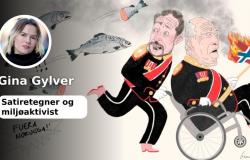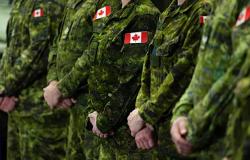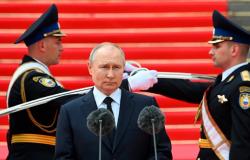Norwegian peace policy and commitment to peace was the topic of NRK’s ”The Debate” on Tuesday evening. The title of the broadcast was “Peace work to trouble?”.
On that occasion, presenter Fredrik Solvang had brought in political scientist and professor Øyvind Østerud at the University of Oslo.
Østerud’s role was apparently to explain whether Norway’s commitment to peace since the 1990s had been successful or unsuccessful.
Solvang presented a world map of 23 countries and areas with Norwegian peace commitment.
Solvang guided the TV viewers through a selection of Norwegian peace processes to give an impression of the result after many years of Norwegian efforts and commitment to peace.
The presenter made reservations that the overview was not complete, as “Norway’s work in this field here is actually conducted in confidence”.
Solvang summarized six known peace processes with Norwegian involvement, of which four were declared failures, one was presented as a “conditional success” and one was described as “reasonably successful”.
also read
It is hopeless. And we don’t give up
– A distorted representation
However, Solvang’s review was reprimanded by both Foreign Minister Espen Barth Eide and the retired diplomat Kåre Aas. The latter has held important positions such as Norway’s ambassador to the USA, Israel and Afghanistan.
– The conflict you didn’t talk about was Colombia. It is actually a classic peace agreement that came into place after Norwegian efforts. It is the largest, most recent peace agreement. It was not included in your overview, Eide pointed out in the Debate.
– No, I don’t know why. Colombia missed us, Solvang said.
A little later in the broadcast, ex-ambassador Aas highlighted two further “Norwegian” peace processes that have been successful.
– That’s what the foreign minister says. The map you showed only showed where we have not been successful. But there are other areas where we have been successful. In addition to Colombia, there are, for example, Nepal and the Philippines, said Aas.
Colombia, Nepal and the Philippines were indeed marked red on Debate’s map of countries where Norway has had a peace commitment, but none of the countries were mentioned in Solvang’s summary.
– What do you think that the Debate failed to include Colombia, Nepal and the Philippines in this presentation of Norwegian peace processes, Kåre Aas?
– The presentation was skewed in the sense that NRK and the presenter were concerned, as I experienced it, with bringing out what had not been successful rather than highlighting where Norway has actually been engaged, including what has been successful and of importance to millions of people, says Aas to Nettavisen.
Aas points out that Norwegian peace diplomacy and reconciliation efforts are in Norway’s own interest and are part of Norwegian tradition and Norwegian realpolitik. He says that a peaceful and stable world is important for Norway.
– Even where the parties have not reached a final peace agreement, Norway has contributed to results such as humanitarian access and ceasefires, he says.
– The other part is that many countries are following suit and want to do what we have been doing for the past decades. They see that it is in their own interest. This applies, for example, to Germany, Ireland, Turkey, Canada and Great Britain together with a number of countries outside the West. They see the value in the work Norway is doing, and want to take part in such work themselves, says Aas.
Six countries and areas that Solvang highlights in the Debate:
- The Oslo Agreement in the 1990s (peace process between Israel and the Palestinians). Professor Østerud and Solvang’s conclusion: Absolutely no peace in the Middle East.
- Sri Lanka Norway tried to facilitate a peace process between 2000 and 2006. Conclusion: Went really badly – did not lead to any peace between the Tamil Tigers and government forces, did not become peace until the latter won the war.
- East Timor: Norway supported the peace process between Indonesia and East Timor. The peace process was “reasonably successful”.
- Sudan and South Sudan. Norway, with Great Britain and the United States, were the driving forces behind a peace agreement: “reasonably successful secession” for South Sudan, but after this a failure – one of the “most failed states in the world”.
- Guatemala: A peace process in the 1990s. Became a peace settlement between the rebel guerrillas and the government forces. Later studies show that there was “a lot of decentralized violence afterwards”. Conclusion: A “conditional success”.
- Afghanistan: The overall result was a “complete failure” when the Taliban regained power in August 2021. Tens of billions spent on the entire Norwegian effort. But not Norwegian peace mediation. “Strictly speaking, not a peace effort”.
NRK editor: – A nuanced selection
News editor at NRK, Knut Magnus Berge, believes that the Debate presented a nuanced selection of the peace processes that Norway has been involved in in recent decades.
– I believe that we have presented a more nuanced picture where we also highlight things that have been successful. In that sense, I do not agree that we have only focused on the negative. But we agree that we could have mentioned Colombia, says Berge to Nettavisen.
– I think everyone understands that we could not go through all processes. These six processes were a selection with examples of four processes that were not so good and two processes that were reasonably good, he says.
– All the processes that you mention (Colombia, Nepal, Philippines ed. note) were discussed in the programme. And Fredrik himself said that Colombia would have been natural to include, says Berge.
also read
Fired in the “Debate”: – Nothing came of the Taliban visit
Henrik Urdal is director of the Institute for Peace Research (Prio). He says that Colombia is the best example of a successful peace process.
– I would think it would be natural to bring that up, and especially Colombia where the Norwegian contribution has been so clear. The Colombia conflict lasted 60 years and led to several hundred thousand deaths. It is not done in one fell swoop to resolve such conflicts, says Urdal to Nettavisen.
– Should NRK also include Nepal and the Philippines in this selection?
– At least relatively speaking, these are processes where you have had some success, says Urdal.
– You can point to many processes that have not been successful. This is not to say that one should not try. It is difficult to know this in advance. But of course you have to have a discussion afterwards about what is successful and what is not, says Urdal.
– Contributes to the fact that the doors are always open for us in Washington
Aas emphasizes that peace diplomacy is not something Norway does alone.
– With Sudan and South Sudan, for example, it was this troika consisting of the USA, Great Britain and Norway that worked together. It is an important point, says the former diplomat.
– Another important point is that many of these processes must be seen within a regional framework, in the sense of how neighboring countries relate to the processes. Whether a peace process is to succeed often depends on many factors, not least that neighboring countries support, rather than undermine. There is a lot to be done, but it is well worth working for given the great benefits of peace, says Aas.
– Norway’s peace diplomacy has also given us invaluable input from our most important allies, such as the United States and Great Britain, he says.
Aas was Norway’s ambassador to Washington DC when Donald Trump was the country’s president.
– I have worked a lot with the USA for many years. When we from the Norwegian side have meetings with the American foreign minister, we may think that we will discuss NATO. But what they are starting to talk about are peace processes, such as in the Middle East, with the Taliban, in Colombia, Venezuela, in the Horn of Africa and the Philippines, says Aas.
– They request our assessments, especially where we talk to armed groups or authorities with whom they have no contact. They value Norway as an experienced and operative peace actor who can be impartial when dealing with difficult conflicts. This has been the case under changing American presidents, including Trump, and also where we have different views. The peace work contributes to the fact that the doors are always open for us in Washington. Then we can also take up other important things that are also in our national interest, he says.
Tags: debate NRK Fredrik Solvang Criticizes Debate skewed presentation
-






